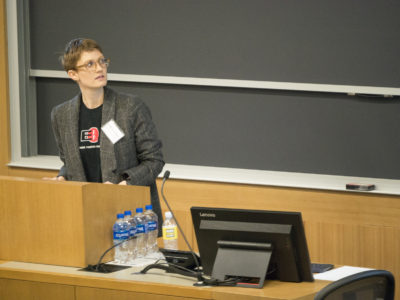
Last December, the Federal Communications Commission repealed net neutrality in a 3-2 vote. The highly contested decision prompted a civil rights debate: should unfettered internet access be a right?
On Friday, a symposium entitled “Governing the Internet: Public Access, Private Regulation,” hosted by The Journal of Science & Technology Law, was held in partnership with Innovate@BU at Boston University’s School of Law.
There were four discussion panels at the symposium, each reflecting on critical issues in internet regulation, like computer fraud and abuse, net neutrality, big data and hacking.
Mitch Stoltz, a panelist at the symposium and senior staff attorney at Electronic Frontier Foundation, explained that net neutrality encourages transparency and prohibits internet service providers from blocking lawful content or prioritizing access to content from bigger, richer websites, like Facebook.
“The idea of net neutrality is that internet service providers should not be able to favor some internet content over others by blocking or by giving priority based on who can pay,” Stoltz said in an interview with The Daily Free Press.
Power concentrated in the hands of a few is an idea that goes against the U.S. Constitution. Now, 241 years after our nation’s birth, a digital monopoly could threaten that democratic ideal.
The fight for the neutrality of communications began in 1934 when Roosevelt signed into law the Communications Act of 1934, which mandated that phones companies exist without discrimination and provide rapid service “with adequate facilities at reasonable charges.”
At that time, phone companies were distinguished as a “common carrier,” which means they were regulated under the government as a utility and any discrimination in service would be illegal.
In 1983, the internet was born, and brought with it a new issue: Congress needed to decide if the internet should be treated the same as phone companies. Then President Bill Clinton signed into law the Telecommunications Act of 1996, which enabled the communications industry to become competitive.
Panelist Dr. Azer Bestavros, founding director of the BU Hariri Institute for Computing, explained that net neutrality’s loss would allow internet service providers to prioritize connections to certain websites over others.
“[Internet service providers] can preferentially treat one type of communication over another. For example, connections to iTunes goes faster than connections to YouTube,” Bestavros said in an interview with The Daily Free Press. “They can do that … and that’s the whole thing about net neutrality, that you should not do that.”
Such conflicts of interest, Bestavros said, wouldn’t be allowed by net neutrality and are commonly prohibited in other industries. “If you are a pharmaceutical company, you cannot fund research in universities that [are] going to advance your company. That is a conflict of interest, we have rules against that.”
Bestavros said internet service providers will either end up in a competitive market, where net neutrality vanishes and ISPs are allowed to set their prices for content providers, or wind up being a public service, where ISPs would be regulated like USPS is under the government.
Annemarie Bridy, a professor of law at the University of Idaho and panelist, spoke about how certain internet sites are becoming more government-like as they develop.
“Facebook has grown to be more like a government,” Bridy said. “We are monitored by it and literally governed by it.”
Amanda Simile, a first-year law student at the Boston University School of Law interested in the field of intellectual property, said she thinks regulating digital giants, like Facebook, is important to the internet’s future functionality.
“We need to figure something out in regard to this triangle of free speech … how to regulate that and how to figure out what is happening when these companies are taking on the role of government administration,” Simile said.




